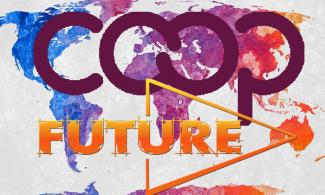by Michael Peck
Sixty years later, the global industrial worker cooperative phenomenon, Mondragon, inspired by a village priest, proves that a transformational solidarity economic vision backed up by decades of persevering sweat equity can make all the difference between endemic poverty and a sustaining middle class.
Yesterday at the Franciscan University at Steubenville, Ohio, I witnessed the privilege of seeing my niece graduate from the Buckeye Online School for Success (BOSS). The ample auditorium hosted over 150 online, home-schooled, high school graduates, filled to capacity with beaming, cheering parents, neighbors and friends fully participating in a program reminiscent of a capacity attended “Mega Church” Sunday service for the faithful with Judson Laipply (“The Evolution of Dance”) as the commencement speaker. A good portion of the graduates received over $450,000 in scholarships for higher education studies and even though most of these students had never met each other before this ceremony, one could sense the strength and reinvention potential in this new kind of virtually bonding academic community in the middle of Appalachia. America transforming for the better right before its own eyes.
Father Jose Maria Arizmendiarrieta, the Mondragon priest who started out with the radical idea of cross-pollinating community collaboration in the middle of abject devastation caused by a crippling civil war and then World War Two, began with a humble village school that graduated five engineers and went on in 1943 to become Mondragon University. Today, with a clear social vocation, Mondragon University annually teaches more than 3,000 students based on shared societal principles such as the sovereignty of labor and employment, the important but subordinate role of capital, cooperation, democracy, and solidarity. These principles are practiced as well as preached on three academic campuses through the inter-connectivity of three collectives with equal participation status: worker partners (owners of the university cooperative with capital assets), collaborating partners (representatives from other cooperatives and non-cooperative companies and other institutions), and enrolled students.
The Franciscan University of Steubenville showcases a perfectly manicured, elegant, and allegorical campus – high above the abandoned industrial economy carcasses sprawled along both sides of the Ohio River with silent, dark steel mills and coal plants like dead industrial dinosaurs on each river bank simulating a shadow-filled Jurassic Park of outsourcing and devastating job loss for extraction communities that depended on them to survive and thrive. Yesterday’s employers who set up shop along the water’s edge to benefit from unregulated waste dumping, engine plant cooling, and free hydro power plus river barge transportation – now act as silent and absent ownership partners to high crime and high poverty in population receding cities with few new prospects.
Weirton, WV and Steubenville, stare at each other across the Ohio river like tired and discouraged boxers way past their primes, too depressed to even summon the memories of full employment years, lolling about with dead certainty that there will never be another brass ring round to cut into the slow, sad sounds of silence floating between mined mountains where only scrap metal scavengers and frackers still lick their chops. Hospitals have become the major employers in these economies, the business of tending to the aging sick and dying.
Today’s global social economy debate on inhibiting inequalities (wealth aggregation, social mobility, and basic opportunities) illustrates the vital roles that structure and values play to foster community-focused, triple bottomline, socially-oriented businesses that can’t be outsourced. Similar to the progressive advocacy media depiction of Jackson Rising: Creating the Mondragon of the South there is so much Appalachian hilltop and valley academic centers can do to organize and network inspiring rust belt graduates into a better future that allows them not only to be home-schooled but also locally and gainfully employed.
The contrast between the beautifully manicured Franciscan University on the hill positioning statutes of Christ dying for mankind’s sins in front of first world campus buildings overlooking third world discarded rank and file industrial plants below couldn’t be more stark. This is Appalachian Ohio’s economic rendition of the Paris of Toulouse Latrec with the Sacre Coeur Cathedral calling out to the poorest and displaced in Pigalle and at the Moulin Rouge to crane their necks upwards and receive the benefits of an allegorical paradise such as a family and community sustaining job.
Academic ladders out of relative poverty can reverse any perceived, inexorable slide into under-capacitated and unfulfilled individual potential in cities and towns given up as perennially dying. Weirton and Steubenville in 2014 represent transformational opportunities as Mondragon did in the 1940s but with the “one graduate, one vote” heartbeat of “BOSS” America – ready for the next substitute village priest or community activists with an abiding cooperative and egalitarian vision to arrive.
www.1worker1vote.org is launching to knock on these doors on behalf of America’s rising solidarity economy where stakeholders and shareholders are one and the same and where there is no ownership difference between those who live up on the ridges or down in the valleys, who work on the shop floor or in the office with a window. A traditional sense of community accelerated through a mastery of interactive online technology is creating tomorrow’s far more horizontal economy with the potential to leaven and re-seed yesterday’s industrial morass into something more sustainable and equal. Turning Appalachia’s hard times valleys and cruelly mined mountain tops into opportunity trampolines will depend on a collective sense of local self-promise and determination to seize this day of reckoning and make every life and livelihood count.
-Michael Alden Peck-
Mondragon North America delegate, co-founder of www.1worker1vote.org, worked for U.S. Senator Robert C. Byrd from 1984-1986 and chaired West Virginia’s then Software Valley movement.
This blog was originally published on 1worker1vote.org.



Add new comment